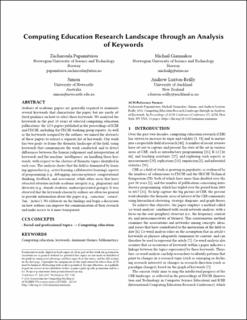Computing Education Research Landscape through an Analysis of Keywords
Chapter
Accepted version
Permanent lenke
https://hdl.handle.net/11250/2736771Utgivelsesdato
2020Metadata
Vis full innførselSamlinger
Originalversjon
https://doi.org/10.1145/3372782.3406276Sammendrag
Authors of academic papers are generally required to nominate several keywords that characterize the paper, but are rarely offered guidance on how to select those keywords. We analyzed the keywords in the past 15 years of selected computing education publications: the 1274 papers published in the proceedings of ICER and ITiCSE, including the ITiCSE working group reports. As well as the keywords assigned by the authors, we mined the abstracts of these papers to extract a separate list of keywords. Our work has two goals: to frame the thematic landscape of the field, using keywords that communicate the work conducted; and to detect differences between the human judgement and interpretation of keywords and the machine 'intelligence' on handling those keywords, with respect to the clusters of thematic topics identified in each case. The analysis shows that the field is dominated by learning approaches (e.g., active learning, collaborative learning), aspects of programming (e.g., debugging, misconceptions), computational thinking, feedback, and assessment, while other areas that have attracted attention include academic integrity (e.g., plagiarism) and diversity (e.g., female students, underrepresented groups). It was observed that the keywords chosen by authors are often too general to provide information about the paper (e.g., 'concerns', 'course', 'fun', 'justice'). We elaborate on the findings and begin a discussion on how authors can improve the communication of their research and make access to it more transparent.
